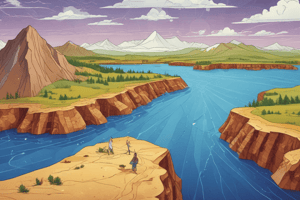Podcast
Questions and Answers
ما هي الدراسة العلمية للزلازل وأسبابها؟
ما هي الدراسة العلمية للزلازل وأسبابها؟
- علم الزلازل (correct)
- علم الجيولوجيا
- علم الجغرافيا
- علم الفلك
ما هو الفرع العلمي الذي يدرس الزلازل التاريخية وتأثيراتها على السكان والبنى التحتية؟
ما هو الفرع العلمي الذي يدرس الزلازل التاريخية وتأثيراتها على السكان والبنى التحتية؟
- علم الجغرافيا التاريخية
- علم الآثار
- علم الأنثروبولوجيا
- علم الزلازل التاريخي (correct)
ما هي العملية الفيزيائية الرئيسية التي تؤدي إلى حدوث الزلازل؟
ما هي العملية الفيزيائية الرئيسية التي تؤدي إلى حدوث الزلازل؟
- تحرك القمر
- تحرك الشمس
- تحرك الصفائح التكتونية (correct)
- تحرك الكواكب
ما هي إحدى الأنشطة البشرية التي يمكن أن تؤدي إلى حدوث زلازل؟
ما هي إحدى الأنشطة البشرية التي يمكن أن تؤدي إلى حدوث زلازل؟
ما هي إحدى الطرق التي يستخدمها علماء الزلازل لجمع المعلومات حول الزلازل وبنية الأرض؟
ما هي إحدى الطرق التي يستخدمها علماء الزلازل لجمع المعلومات حول الزلازل وبنية الأرض؟
ما هو الغرض الرئيسي من نماذج التنبؤ التي يستخدمها علماء الزلازل؟
ما هو الغرض الرئيسي من نماذج التنبؤ التي يستخدمها علماء الزلازل؟
ما هي إحدى الاستراتيجيات التي يطورها علماء الزلازل للحد من الأضرار المحتملة للزلازل؟
ما هي إحدى الاستراتيجيات التي يطورها علماء الزلازل للحد من الأضرار المحتملة للزلازل؟
ما هي الفائدة الرئيسية من دراسة الزلازل السابقة وحركات الصفائح الحالية؟
ما هي الفائدة الرئيسية من دراسة الزلازل السابقة وحركات الصفائح الحالية؟
ما هو الغرض الرئيسي من حملات التوعية العامة حول سلامة الزلازل؟
ما هو الغرض الرئيسي من حملات التوعية العامة حول سلامة الزلازل؟
ما هي أحد الجوانب الرئيسية التي يركز عليها علماء الزلازل في استراتيجيات التخفيف من آثار الزلازل؟
ما هي أحد الجوانب الرئيسية التي يركز عليها علماء الزلازل في استراتيجيات التخفيف من آثار الزلازل؟
Flashcards are hidden until you start studying
Study Notes
Seismology: Understanding Earthquakes and Their Impacts
Introduction
Seismology is the scientific study of earthquakes and their underlying causes. It involves understanding the physical processes that generate earthquakes, predicting their occurrence, and assessing the potential impacts on people and the environment. Seismologists use various techniques, including geodesy, geomorphology, tectonics, and physics, to gather information about earthquakes and the Earth's structure.
Earthquake Mechanisms and Causes
Earthquakes are caused by the release of energy within the Earth's crust that creates seismic waves. These releases of energy can occur naturally or be triggered by human activities such as mining or drilling. The most common cause of earthquakes is the movement of tectonic plates that make up the Earth's crust and upper mantle. When these plates move, they can create stress on the rocks between them, leading to fractures and the release of energy in the form of seismic waves.
Historical Seismology: Past Earthquakes and Their Impacts
Historical seismology involves studying past earthquakes and their impacts on populations and infrastructure. For example, researchers have studied earthquakes in the Philippines during the 19th and 20th centuries, documenting damages to buildings and infrastructures caused by various events. These studies help us understand the historical context of earthquakes and how societies have responded to them over time.
Predictive Modeling and Mitigation Strategies
Seismologists use predictive models to estimate the likelihood of future earthquakes based on factors such as plate movements, stress accumulation, and geological conditions. They also develop mitigation strategies to reduce the potential damage from earthquakes. These strategies may include building codes that require structures to withstand strong shaking, public education campaigns about earthquake safety, and plans for emergency response and recovery.
Conclusion
Seismology plays a crucial role in understanding the complex mechanisms behind earthquakes and developing strategies to minimize their impact on human societies. By studying past earthquakes and current plate movements, researchers can better understand how to prepare for and respond to these natural events.
Studying That Suits You
Use AI to generate personalized quizzes and flashcards to suit your learning preferences.




